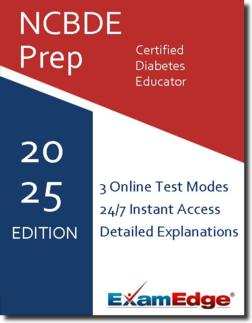Certified Diabetes Educator (CDE®) Practice Tests & Test Prep by Exam Edge - FAQ
Based on 20 Reviews
- Real Exam Simulation: Timed questions and matching content build comfort for your Certified Diabetes Educator test day.
- Instant, 24/7 Access: Web-based Certified Diabetes Educator practice exams with no software needed.
- Clear Explanations: Step-by-step answers and explanations for your NCBDE exam to strengthen understanding.
- Boosted Confidence: Reduces anxiety and improves test-taking skills to ace your Certified Diabetes Educator (CDE).

Why should I use Exam Edge to prepare for the Certified Diabetes Educator Exam?
FAQ's for Exam Edge Certified Diabetes Educator practice tests
- Comprehensive content: Exam Edge's Certified Diabetes Educator practice tests are created specifically to prepare you for the real exam. All our Certified Diabetes Educator practice test questions parallel the topics covered on the real test. The topics themselves are covered in the same proportions as the real test too, based on outlines provided by the National Certification Board for Diabetes Educators in their Certified Diabetes Educator test guidelines.
- Realistic practice: Our Certified Diabetes Educator practice exams are designed to help familiarize you with the real test. With the same time limits as the real exam, Our NCBDE practice tests enable you to practice your pacing and time management ahead of test day.
- Detailed explanations: As you complete your practice tests, we show you which questions you answered correctly and which ones you answered incorrectly, in addition to providing you with detailed step-by-step explanations for every single Certified Diabetes Educator practice exam question.
- Performance insights: After you complete a practice test, we provide you with your raw score (how many you answered correctly) and our estimate of the Certified Diabetes Educator score you would have received if you had taken the real test.
- Ease of access: Because all Our NCBDE practice tests are web-based, there is no software to install. You can take Certified Diabetes Educator practice exams on any device with access to the internet, at any time.
- Flexible use: If you must pause while taking one of Our NCBDE practice exam, you can continue right where you left off. When you continue the test, you will start exactly where you were, and with the same amount of time you had remaining.
- Thousands of unique questions: We offer 15 different online practice exams with 1,500 unique questions to help you prepare for your Certified Diabetes Educator!
- Low cost: The cost of ordering 5 practice tests is less than the cost of taking the real Certified Diabetes Educator test. In other words, it would be less expensive to order 5 practice tests than to retake the real Certified Diabetes Educator exam!
- Our trusted reputation: As a fully accredited member of the Better Business Bureau, we uphold the highest level of business standards. You can rest assured that we maintain all of the BBB Standards for Trust.
- Additional support: If you need additional help, we offer specialized tutoring. Our tutors are trained to help prepare you for success on the Certified Diabetes Educator exam.
What score do I need to pass the Certified Diabetes Educator Exam?
To pass the Certified Diabetes Educator test you need a score of 70.
The range of possible scores is 0 to 100.
How do I know the practice tests are reflective of the actual Certified Diabetes Educator?
At Exam Edge, we are proud to invest time and effort to make sure that Our NCBDE practice tests are as realistic as possible. Our practice tests help you prepare by replicating key qualities of the real test, including:
- The topics covered
- The level of difficulty
- The maximum time-limit
- The look and feel of navigating the exam
Do you offer practice tests for other National Certification Board for Diabetes Educators subjects?
Yes! We offer practice tests for 1 different exam subjects, and there are 15 unique exams utilizing 1500 practice exam questions. Every subject has a free sample practice test you can try too!
Certified Diabetes Educator
(CDE
®
)
Practice Tests
To order tests, or take a sample test, for a different subject:
Click on ' Name on the Exam Name' You will be take to the orders page
How do I register for the real National Certification Board for Diabetes Educators?
For up-to-date information about registration for the National Certification Board for Diabetes Educators, refer to the National Certification Board for Diabetes Educators website.


